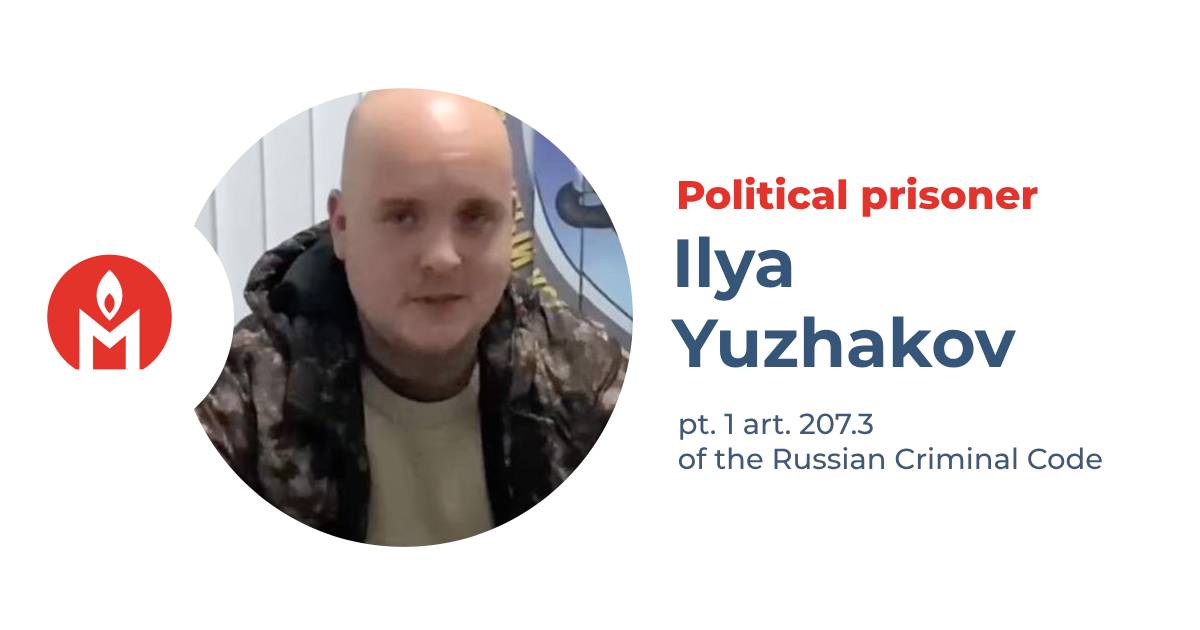Ilya Yuzhakov is a political prisoner
A resident of Tuapse was sentenced to three years’ compulsory work in custody for comments about Russian strikes on Ukrainian cities.
The ‘Political Prisoners. Memorial’ human rights project, in accordance with international standards, considers Ilya Yuzhakov a political prisoner. Yuzhakov was convicted on a criminal charge of disseminating information known to be false about the Russian army for comments he posted on the VK social media site. His criminal prosecution and conviction violated his rights to freedom of expression and a fair trial. We demand the release of Ilya Yuzhakov and that all criminal charges against him be dropped.

What were the charges against Ilya Yuzhakov?
Ilya Yuzhakov was convicted for posting comments under a post in the ‘Tuapse’ group on VK, which referred to the ‘alleged involvement of the armed forces of the Russian Federation in numerous rocket and artillery strikes on the civilian population’ in Ukraine. He was charged with public dissemination of information known to be false about the use of the Russian armed forces (Article 207.3, Part 1, of the Russian Criminal Code).
The court ruled that information in Yuzhakov’s comments was known to be false, on the grounds that it was contradicted by a report from the Main Operational Directorate of the Russian General Staff marked ‘for official use only.’ Yuzhakov agreed to a plea bargain and pleaded guilty.
On 19 February 2025, Ilya Yuzhakov was sentenced to three years’ compulsory work in a correctional centre, with 15% of his earnings to be withheld in favour of the state.
In March 2025, after the sentence had been handed down, the security services published a video of his arrest. In the footage, Yuzhakov is shown being led from his home, placed in a vehicle, and then forced to express remorse on camera.
Why do we consider Ilya Yuzhakov a political prisoner?
The offence of disseminating information known to be false about the Russian army, of which Yuzhakov was convicted, was introduced into the Russian Criminal Code immediately after Russia launched its full-scale war against Ukraine. In practice, this law bans the dissemination of any information about the war that differs from the official narrative, in violation of the civil right to freedom of expression.
This article of the Criminal Code contradicts both the Russian Constitution and Russia’s international legal obligations, as well as fundamental principles of law, notably the principle of legal certainty. Under this law, a citizen cannot possibly know in advance what information may be deemed false. Still less is it possible for a prosecution to prove intent to disseminate false information. We consider all prosecutions under this article unlawful.
The information that Russian forces launched rocket and artillery strikes on the civilian population of Ukraine is not false. Russia has done so since the beginning of the war, and this is confirmed by numerous independent sources.
Criticism of the war and drawing public attention to war crimes should not be treated as criminal acts. On the contrary, such actions serve the public interest. Yuzhakov’s comments cannot be considered grounds for criminal prosecution, still less imprisonment.
A detailed description of Yuzhakov’s case and of our position is available on our website.
Recognition of an individual as a political prisoner does not imply the ‘Political Prisoners. Memorial’ human rights project agrees with, or approves, their views, statements, or actions.
How can you help?
You can donate to help all political prisoners in Russia.
